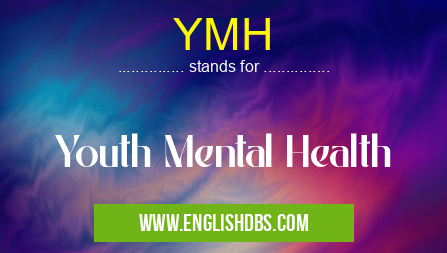What does YMH mean in YOUTH
YMH is an acronym that stands for Youth Mental Health. It encompasses the mental health and well-being of individuals from adolescence to young adulthood, typically ranging from 12 to 25 years old.

YMH meaning in Youth in Community
YMH mostly used in an acronym Youth in Category Community that means Youth Mental Health
Shorthand: YMH,
Full Form: Youth Mental Health
For more information of "Youth Mental Health", see the section below.
Key Points
- Significance: Youth mental health is crucial for overall well-being, academic success, and future life outcomes.
- Prevalence: Mental health disorders are common among youth, with an estimated 1 in 5 experiencing a disorder in any given year.
- Impact: Untreated mental health issues can have significant consequences, including academic difficulties, social isolation, and future mental health problems.
- Early Intervention: Early identification and intervention are essential for improving outcomes and preventing long-term consequences.
- Community Involvement: Communities play a vital role in supporting youth mental health through schools, healthcare providers, and community organizations.
Common Youth Mental Health Concerns
- Anxiety disorders
- Depression
- Eating disorders
- Substance use
- Relationship problems
- Self-harm
- Suicidal thoughts
Challenges in Youth Mental Health
- Stigma: Youth may experience stigma and shame associated with mental health issues, leading to reluctance to seek help.
- Access to Care: Barriers to accessing mental health services, such as cost, availability, and transportation, can limit care for youth.
- Limited Understanding: Misconceptions and lack of awareness about youth mental health can hinder understanding and support within communities.
Essential Questions and Answers on Youth Mental Health in "COMMUNITY»YOUTH"
Why is YMH important?
YMH is crucial because mental health issues can significantly affect a young person's development, academic performance, and overall well-being. Addressing YMH concerns early on can prevent more serious issues in adulthood.
What are the common YMH disorders?
Common YMH disorders include anxiety disorders (e.g., generalized anxiety disorder, social anxiety disorder), depressive disorders (e.g., major depressive disorder, persistent depressive disorder), and attention-deficit/hyperactivity disorder (ADHD).
What are the signs and symptoms of YMH concerns?
Signs and symptoms can vary depending on the specific disorder, but general indicators may include excessive worry, sadness, changes in sleep or eating patterns, difficulty concentrating, irritability, and withdrawal from social activities.
What causes YMH concerns?
YMH concerns can be caused by a combination of factors, including genetics, environment, and social experiences. Stressful life events, trauma, and peer pressure can also contribute.
How are YMH concerns diagnosed?
Diagnosis typically involves a comprehensive evaluation by a mental health professional, including a physical exam, psychological assessment, and interview with the young person and their parents or guardians.
What are the treatment options for YMH concerns?
Treatment options vary depending on the specific disorder and individual needs, but may include therapy (e.g., cognitive-behavioral therapy, family therapy), medication, and lifestyle changes such as exercise and healthy sleep habits.
How can I support a young person with YMH concerns?
Be supportive, understanding, and non-judgmental. Encourage them to talk about their feelings and seek professional help if needed. Provide a safe and stable environment, and connect them with community resources.
Where can I find more information on YMH?
Reputable sources for YMH information include the National Alliance on Mental Illness (NAMI), the Substance Abuse and Mental Health Services Administration (SAMHSA), and the National Institute of Mental Health (NIMH).
Final Words: Youth mental health is an urgent and growing concern, with significant implications for individuals and society as a whole. Promoting early intervention, reducing stigma, and improving access to care are critical for supporting the mental well-being of our youth. Through collaboration and community engagement, we can create environments that foster resilience, provide support, and empower young people to thrive.
YMH also stands for: |
|
| All stands for YMH |
